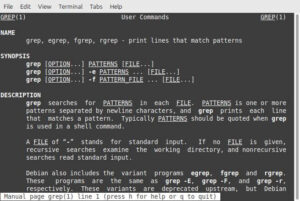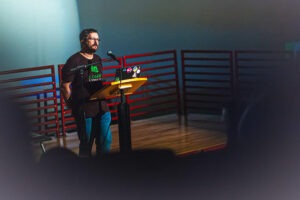FOSS Force’s Marco Fioretti asks LibreOffice’s Italo Vignoli and Collabora’s Naomi Obbard about why their software isn’t used in more schools, and what can be done to turn that around.

Much free and open source software helps its users save money as possible — on both hardware and software — while protecting their privacy. It also often makes it easy for them to learn how it works — if they’re interested — and customize it in any way they want or need.
With such features, FOSS should be the default choice in any educational environment, in these days when many schools face budget cuts, and switching to “free as in free beer” proprietary cloud applications like Microsoft Teams or Google Docs to save money has the consequence of actively preparing and educating pupils to be endless sources of data to be exploited for the likes of money and political control.
That being true, how come so many schools and universities still accept — if not demand — that their students use only proprietary software and clouds? How come so many taxpayer dollars allocated for public education ends up being used to make the likes of Microsoft and Google even richer? Saving money can’t be the only answer — especially in the long term.
What’s Standing in the Way?
There are scores of FOSS applications suitable for schools, but to make my point as briefly as possible, I will focus only on two that would be useful in every classroom, from primary school to university: LibreOffice and Collabora Online.
In many ways, these are two sides of the same coin. The first is a powerful, highly interoperable desktop suite for complex texts, spreadsheets, and presentations. The second, harnesses LibreOffice, but makes it possible to create the same documents online on any browser, and adds the ability for collaborative editing. The latter is almost essential in some classroom settings, because it means students and teachers are able to work together on projects and assignments, which increases engagement and improves learning outcomes.
I have been following FOSS in schools for many years, even before my 2005 series on Linux in Italian Schools. In my experience, besides ignorance and resistance to change, the main reasons why too many schools still don’t use LibreOffice and Collabora Online in 2025 are, in no particular order:
- Money: Although FOSS is free of charge, switching it out for proprietary software such as Office 365 that students and faculty already know how to use, has upfront training costs.
- Already established supply chains: Often, specific computers with preloaded applications, or online services, are on “preapproved” lists and can be ordered without prior approval; using or ordering anything not on the list, even if free, can involve red tape.
- Teacher overload: Some teachers have so much on their plate that they avoid and any non-mandatory task (including learning new software) that’s not perceived as urgent and necessary.
- Isolation: Similar to unmaintained FOSS project, many FOSS success stories in schools — including those in my 2005 series — are one-person efforts, that are shelved as soon as that one teacher retires or moves to another school.
- Cloud computing: The obvious advantage to online apps is that they let teachers and students work with any combination of browsers and devices they already have, and make teamwork and saving money easier. The trouble is that proprietary cloud apps — or FOSS apps being run on proprietary clouds — not only makes FOSS irrelevant, it locks-in the opportunities for abuses from big tech’s bag of tricks.
- Improper formatting choices: The biggest culprit here is using non-standard fonts or using platform specific macros, both of which can create completely unnecessary problems when sharing documents across platforms.
Talking With the Experts
In order to get a more complete picture — as well as practical advice — I contacted Italo Vignoli, co-founder of The Document Foundation, the organization behind LibreOffice, and Naomi Obbard, marketing lead at Collabora Productivity to have them explain why their products would be important for schools, and much simpler to adopt than many think.
Fioretti: Why are so many schools and universities using proprietary software and clouds?
Obbard: Because this seems to be the default choice for many people, especially those who are unaware that there are alternatives that can provide the same, and often better experience for their users.
Vignoli: Marco, the reasons you mention only explain the bottom part of the whole picture. If all its public schools switched to FOSS, Italy could save millions of euros, but it’s the Italian government that forces the use of Microsoft 365, despite its clear incompatibility with the GDPR. Truth is, it is often lobbyists who cause schools to spend money in the wrong way in order to keep up with the commercial strategies of big tech. That, plus sheer ignorance and general resistance to change is what still keep FOSS out of many schools.
Fioretti: Can you share the elevator pitch you might use to convince a school principal to migrate the school and students to LibreOffice and/or Collabora Online?
Vignoli: Choosing between proprietary and FOSS software in schools is like choosing between a passive and a proactive approach to learning. Audrey Tang, former Ministry of Digitalization in Taiwan, once said: “FOSS is a platform for digital education, because it can be used to grow the understanding that digital tools are key for our future, and we can tweak these tools to reflect our needs.”
Speaking of LibreOffice, if even CERN is using it (and Linux too) for many tasks, I dont see how it could not be adequate for students at all levels. The only specific task where LibreOffice is not on par with Excel are advanced financial simulations, that only a tiny minority of students ever needs.
Obbard: Collabora Online is a powerful, collaborative office suite entirely built with open software and standards. For end users, Collabora Online means working together online, with a familiar user interface that runs in any modern browser, including mobile ones.
Schools and other organizations can use it through any [hosting] partner they want, including our 200-plus official ones, or installing it on their own servers. This means no risks of lock-in, full compliance with privacy regulations, and plenty of additional features by integrating Collabora Online with tools like Moodle, Nextcloud and even SharePoint.
Speaking of costs, our community edition is available for anyone to use freely and self-manage, but we would encourage anyone to use the professional edition that is fully supported, with most help tickets being responded to within 24 hours. We offer excellent discounts for educational institutions and non-governmental organizations that want to adopt open source principles.
Fioretti: Can you share some success stories about LibreOffice and Collabora Online you might use to follow your pitches?
Vignoli: As far as LibreOffice is concerned, apart from Taiwan, where there is a clear strategy, I do not know success stories which can be shared. One big reason for this is that, as far as LibreOffice is concerned, many success stories are stories of individual teacher or administrators who use it in spite of regulations — or the will of other teachers — and therefore tend to hide as much as possible their work with FOSS.
Obbard: You can find plenty of success stories among our case studies, but the ones most relevant for schools may be:
- Friedrich List Gemeinschaftsschule, a German community school with hundreds of users
- the University of Lille [France], where more than 70,000 users between students and staff use Collabora Online as a secure, unified platform
- the SURF organization that enables secure document sharing and real-time collaborations to 59 educational and research Dutch institutions with about 98,000 total users
- SIB, which integrating Collabora Online with Nextcloud serves 33,000 pupils and 25,000 teachers in 57 French middle schools
- Antecedent [education-focused technology company], that uses Collabora Online to track real-time editing of students’ writing process to detect plagiarism and asses the effort within their writing.
Fioretti: Concretely, what should a school do to adopt and make all its students adopt LibreOffice and/or Collabora Online?
Obbard: Just get in contact with us and our 230-plus partners around the world! We would love to help you free your documents and offer support with setting up and maintaining Collabora Online.
Vignoli: For LibreOffice, it can be as simple as encouraging single teachers to use and promote it with students, hopefully with support of local FOSS user groups.
Fioretti: Finally, what should everybody else do to make sure that FOSS adoption in schools lasts, and is sustainable in the long term?
Obbard: Collabora is working alongside a lot of partners and organisations who target governments. A big one is ZenDiS [Germany-based Centre for Digital Sovereignty] with their openDesk product working closely with German public authorities.
Vignoli: There should be a complete change of approach in the FOSS environment, which is sorely missing a strategic approach to almost everything, including nurturing migrations. The proprietary software industry has not only the money but also the strategic approach necessary to ensure the long term success of projects. One example is what happened in Munich, where the FOSS community could easily transform the LiMux project into a systemic win instead of spending time in self-flattering meetings.

Marco Fioretti is an aspiring polymath and idealist without illusions based in Rome, Italy. Marco met Linux, Free as in Freedom Software, and the Web pre-1.0 back in the ’90s while working as an ASIC/FPGA designer in Italy, Sweden, and Silicon Valley. This led to tech writing, including but not limited to hundreds of Free/Open Source tutorials. Over time, this odd combination of experiences has made Marco think way too much about the intersection of tech, ethics, and common sense, turning him into an independent scholar of “Human/digital studies” who yearns for a world with less, but much better, much more open and much more sensible tech than we have today.








